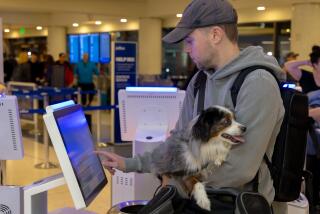Ouch! The airline seat is hurting me. Here’s what you can do to ease the pain.
Question: Our first-class tickets for a trip to Iceland required a change of planes. On the second leg, we were assigned seats A and B in the second row. These seats were not satisfactory even if they had been economy seats. The thought of that flight still hurts my back and neck. There were only 2 inches between our knees and the seats in front of us. We had no footrests, and the incline failed to support the spine. Sleep was impossible. Going to the restroom required gymnastics training. We were luckier than the couple in front of us in the bulkhead seats. He had no place for his feet as he was an average [height] male. She was small, and her legs just dangled. These seats did not qualify as first class. Why weren’t we informed that these planes are now unsuitable for travel by all?
Amy Davis
Denver
Answer: Probably because if the airline said, “You’ll leave our aircraft feeling as though you’ve been hit by a semi,” no one would fly them. The airline also wouldn’t announce this about a coach seat because that wouldn’t be a surprise.
The issue with Davis’ seat boils down to this phrase: high-density seating.
That’s according to Johannes Lampela, director of design for Los Angeles Studio, a subsidiary of BMW, which does design and consulting for airlines.
The aircraft used on the uncomfortable leg of Davis’ journey was a single-aisle 757 in which first class had been reconfigured. The change created both a plus and a minus.
The plus: The configuration, with two seats on each side of the aisle, allows for lie-flat beds.
The minus: The single aisle means that if you are sitting in the window seat and the seat next to you is folded into the bed, your exit route isn’t exactly a graceful step-glide from where you are.
“The window passenger would need to step over a fairly wide area” to access the aisle, Lampela said.
The only solution, he said, would be for the couple to each have chosen an aisle seat.
Everything in aircraft design is a trade-off, Lampela said, as designers struggle with their two biggest enemies: space and weight. “There are always going to be compromises,” he said.
Your best offense may be to bone up on the type of aircraft you’ll be flying. Seatguru.com can tell you which seats to avoid. You might also check Skytrax seat ratings at www.lat.ms/skytraxratings.
As for the uncomfortable seat, all designs undergo physical testing, Lampela said. “Everything is always mocked up and … tested in rounds and rounds of iterations to find the optimal comfort.”
Designing an economy seat presents even greater challenges—less wiggle room, as it were—because space is tight and weight is a concern.
“You have to arrive at a one-size-fits-all baseline ergonomic,” said Anthony Harcup, Anthony Harcup, associate director at Acumen Design Associates in London, which created the first lie-flat bed for British Airways in the ’90s and the recent Residence suite on Etihad.
“You design for the shortest person, effectively, so that person doesn’t have pressure on the underside of the thighs…. If you’re quite tall…you’re likely to experience those pressure points.
“The thing about comfort is that it’s a very difficult thing to capture. It’s not something you can draw a picture of….you can’t record it in a spreadsheet. It has to be experienced.”
But even with all the factors designers take into consideration, “if any one thing is slightly out of kilter, it’s going to affect you,” Harcup said. “You can get nine things out of 10 right and still not be comfortable.”
But here’s the surprise, fliers: Comfort isn’t always about where the seat hits you or the pitch (distance between the seats) or even legroom.
“Often we are viewing comfort as a physical aspect,” Lampela said. “It often is a mental comfort.”
That can be something as major as lighting — Virgin America’s website claims that its A320s have “one of a kind mood lighting, with 12 shades that adapt to outside light” — or as minor as a small compartment in business class that’s upholstered so your watch or cellphone doesn’t get scratched when you place it in there.
Entertainment systems also play a big role, according to CNET magazine, whose “Wanted: A Better Economy Class” noted that perhaps we can be diverted from the uncomfortable coach class seat with a helping hand from tech.
“After all,” Kent German wrote in the fall 2016 issue, “the quality of the service, food and onboard entertainment options matter just as much as seat comfort,”
Until they don’t matter because your body is barking at you.
“I do have patients with spinal conditions who travel by plane relatively quickly after surgery,” said Dr. Jeremy Smith, an orthopedic spine surgeon with Hoag Orthopedic Institute in Orange County, “and the most important factor I tell them — and this should go for anybody — is the necessity of getting up and moving.”
A break for your body every 30 to 45 minutes is “of pivotal importance.”
“The orientation of the chair is such that our posture [while flying can] … create stress and strain on muscle groups and ultimately on the spine and can lead to problems,” Smith said.
Flight attendants may not be crazy about people milling about — never get up when the seat belt sign is on and try not to block service carts in the aisle — but besides helping your bones, you may be helping yourself avoid blood clots, especially on a long flight.
Smith also suggests neck support if you’re snoozing, which also may keep you from drooling on your neighbor.
Finally, Smith said, keep yourself hydrated, which also may force you to get up from time to time and head for the restroom.
If those of us sitting in the cheap seats want to blame someone for our discomfort, we should look in the mirror.
Comfort costs; just ask anyone who’s sitting in business or first. But as leisure travelers, we’re more focused on wringing out every dollar we can so we can extend your vacations. Our obsession with low fares comes at a price. Airlines can’t keep costs low and pamper us at the same time.
“This market is currently driven by cost,” Harcup said. “It’s a race to the bottom. You can’t blame the airlines necessarily for that.”
In the end, the responsibility for your aircraft choice rests with you. Mitigating those choices — moving, stretching, drinking water — also rests with you.
High tech may one day solve seating dilemmas that let you snooze while you cruise, but until then, the rest is yet to come.
Have a travel dilemma? Write to [email protected]. We regret we cannot answer every inquiry.
ALSO
Replica of Cabrillo’s 16th century tall ship to open in San Diego and tour coastal cities
Two lines of London’s Underground will serve the after-midnight crowd on weekends
More to Read
Sign up for The Wild
We’ll help you find the best places to hike, bike and run, as well as the perfect silent spots for meditation and yoga.
You may occasionally receive promotional content from the Los Angeles Times.







